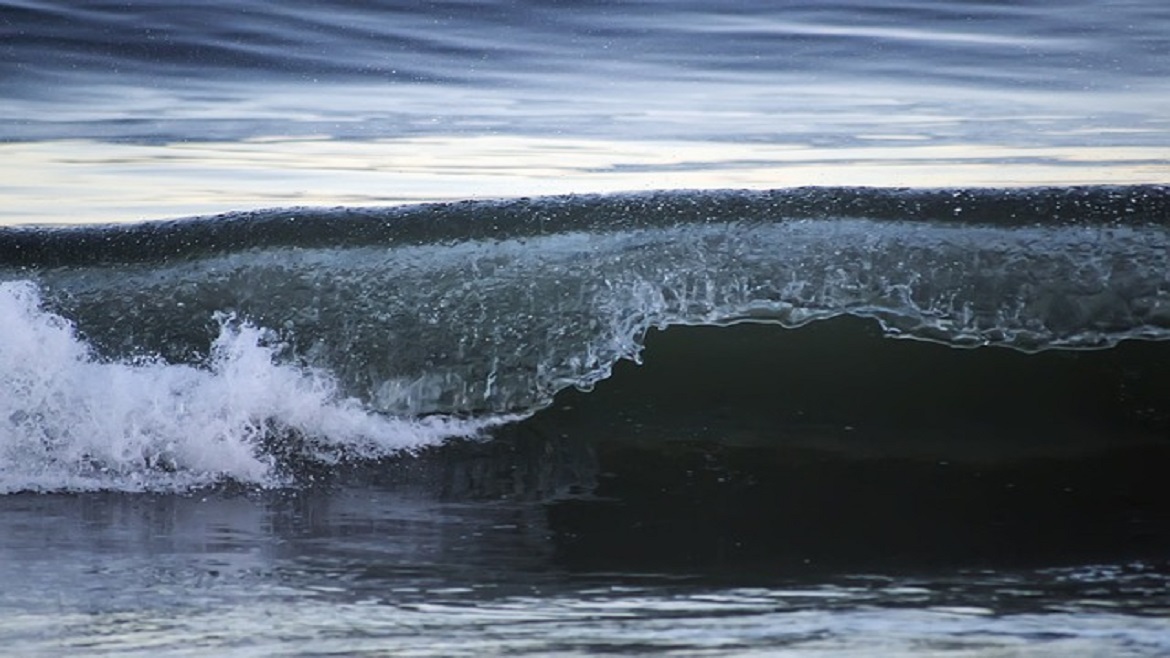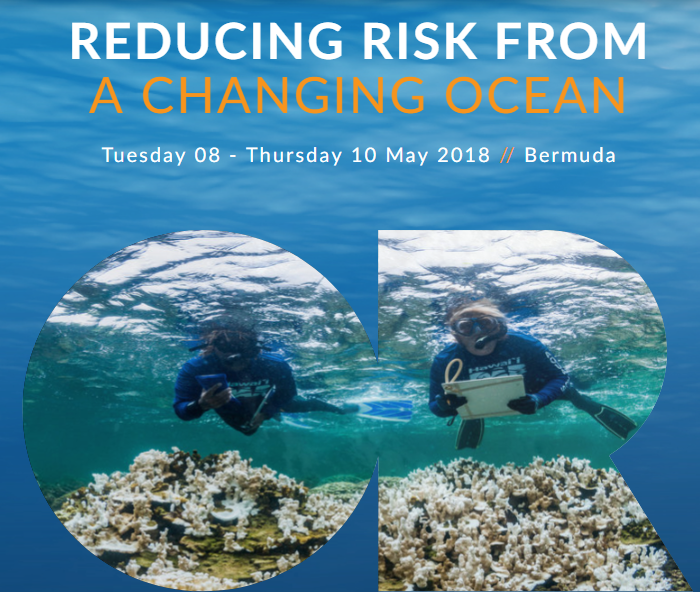If you spent a couple of days in Bermuda—with its stunning pink sand beaches, beautiful sunsets and the northern-most coral reef system in the world—you would be forgiven for not noticing that Bermuda is at the epicentre of ocean risk. In May the island hosted the first ever Ocean Risk Summit—sponsored by global insurance firm XL Catlin along with other partners—which looked at the key challenges and risks posed by ocean change and identified opportunities for innovative approaches to building resilience and mitigating its effects through applied solutions.
The ocean has its own dedicated Sustainable Development Goal (SDG) as part of the 17 SDGs: with SDG14 UN member states have pledged to “conserve and sustainably use the oceans, seas and marine resources for sustainable development”. However, ocean risk has, until now, been a neglected topic. This is surprising given the importance of the ocean for people and planet. If the ocean was an economy it would be the seventh-largest economy by GDP in the world—and would thus sit at the G7 table. And thanks to Canada (which holds the current G7 presidency) it now is! Canada’s minister of fisheries and oceans said that Canada would be putting the ocean on the G7 agenda this year to deepen international co-operation for ocean resilience. The ocean absorbs 93% of additional energy from heat on Earth, so it's highly surprising that there is ten times as much literature on the impacts of land-based climate change than on ocean impacts.
The first-ever Ocean Risk Summit, sponsored by XL Catlin and several other partners, was held at the Fairmont Southampton in Bermuda
What is ocean risk?
The summit focused on risks from ocean change, such as extreme weather, changing ocean temperatures and warming. The year 2017 marked the worst ever year on record in terms of economic losses from weather and climate-related events, at US$320bn. However, participants in the summit were keen to point out that traditional risks, such as commercial ones like loss of cargo, are well known, while it was crucial to address emerging ones such as ocean acidification, ocean hypoxia and marine pollution, which will have major impacts on future life on Earth.
But the traditional risks are rising higher up on the agenda too—and they are already threatening the very existence of small island nations. Bermuda's minister of home affairs highlighted the need to mitigate ocean risks around food security and extreme weather events faced by small island nations. Meanwhile, the permanent representative of Nauru to the UN pointed out that her island is “99.99% ocean” and therefore a case study for the importance of ocean risk. The risk of extreme weather events such as severe cyclones and coral bleaching caused by climate change threatens the collapse of the island’s food security and infrastructure.
The impact of recent hurricanes on the British Virgin Islands is also a microcosm of ocean risk: the island's deputy premier said that the economic damage caused by the hurricanes has been more than 3.5 times the size of the island’s whole economy. All major industries (tourism, fishing, shipping) were devastated.
But the ocean does not only harbour a multitude of risks, it also provides a sea of opportunity. The full potential of the ocean to support sustainable growth hasn't been tapped yet. HSH Prince Albert II of Monaco declared that the “seas contain the seeds of new growth”. This blue growth would harness the potential of renewable energy, sustainable fishing, innovation and other sources.
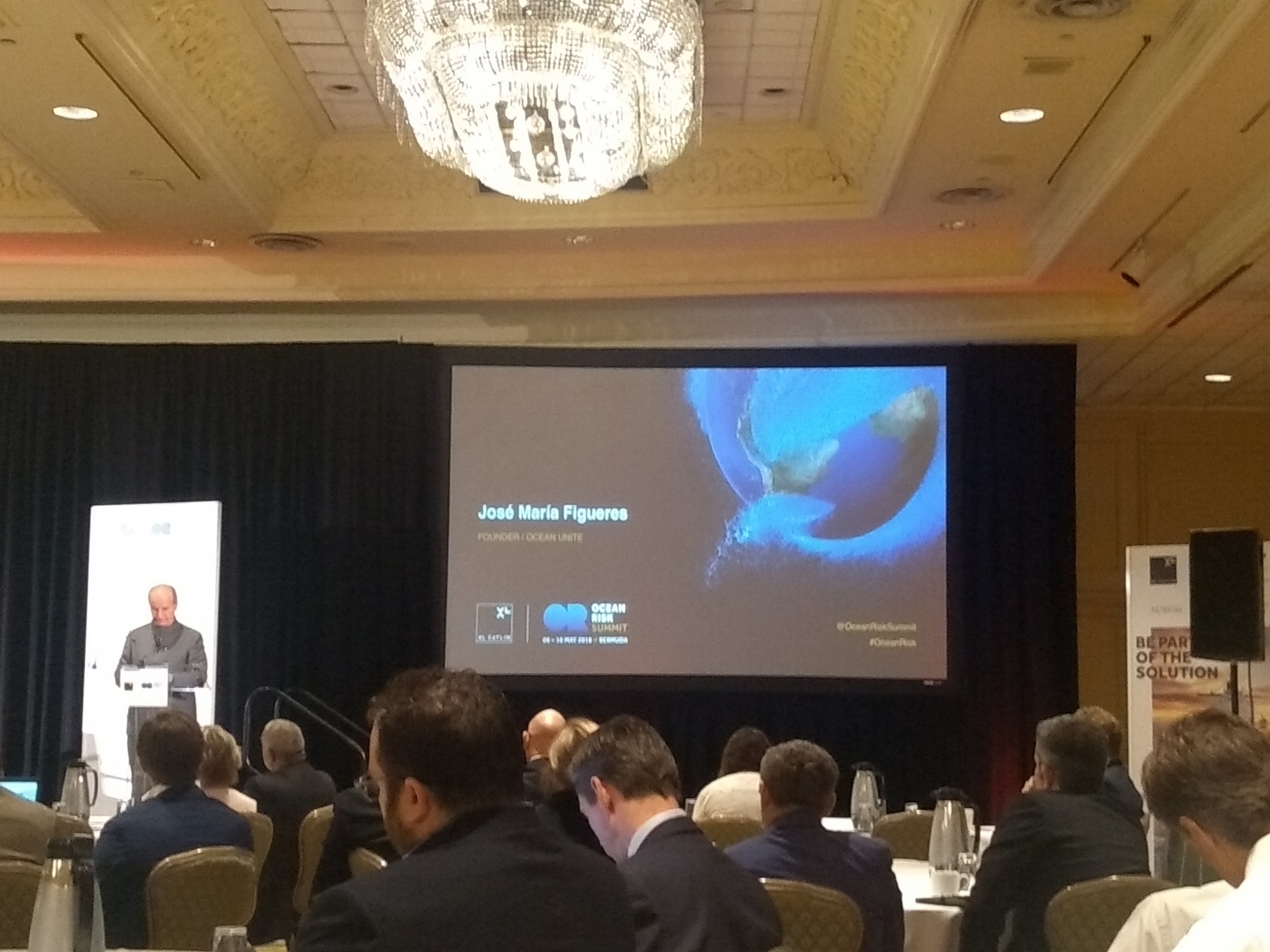
José Maria Figueres, former president of Costa Rica and founder, Ocean Unite, opening the first-ever Ocean Risk Summit in Bermuda, held at the Fairmont Southampton
How to address ocean risks
The UN envoy for oceans suggested that the five key areas for progress needed are:
- ending harmful fishing subsidies;
- ending consumption of illegally caught fish;
- expanding marine protected areas (MPAs);
- boosting environmentally conscious coastal tourism; and
- advancing ocean exploration.
In terms of MPAs, Sir Richard Branson—who joined the summit via Skype—underlined that creating marine reserves worked and benefited the fisheries sector in the long term. He praised the leadership on climate change and oceans in places like California. And he emphasised that business can play a major role in ocean sustainability, as governments can be slow to act.
As far as ocean exploration is concerned, there is still a lot of catching-up to do. Around 95% of our oceans remain unknown. In order to understand ocean risks, we need to advance science. It is crucial to map the ocean, and measure temperatures and emissions. But delegates heard that we need better maps of the ocean floor, to understand better the microbiological components in the ocean, and discover and classify new species. Hence, ocean exploration is crucial, as it enables knowledge-based governance and ultimately reduces risk, using advanced technology such as robots, autonomous vehicles, powerful computing and remote sensing.
The summit also heard that there’s a lack of data sharing in the ocean community. Given rapid ocean deterioration there’s a need to share data, which would open many opportunities for better data aggregation, understanding ocean risk and reversing ocean decline.
Technology has a key role to play in tackling ocean risks. Bermuda's minister of home affairs stressed the importance of science, innovation and collaboration to address risks. Bermuda is at the forefront of scientific progress on measuring ocean conditions. For example, ocean gliders measure conditions such as heat in 1,000 metres depth within three hours, eight times a day. This is crucial to measure warming and hurricane risk.
Florida is another case study of rising ocean risks. It faces multiple risks from hurricanes, tropical storms, tropical depressions and saltwater intrusion. Many promising city initiatives have been introduced throughout the state in order to boost resilience, including retrofitting, sustainable design, seawall projects and regional co-operation on flood mitigation.
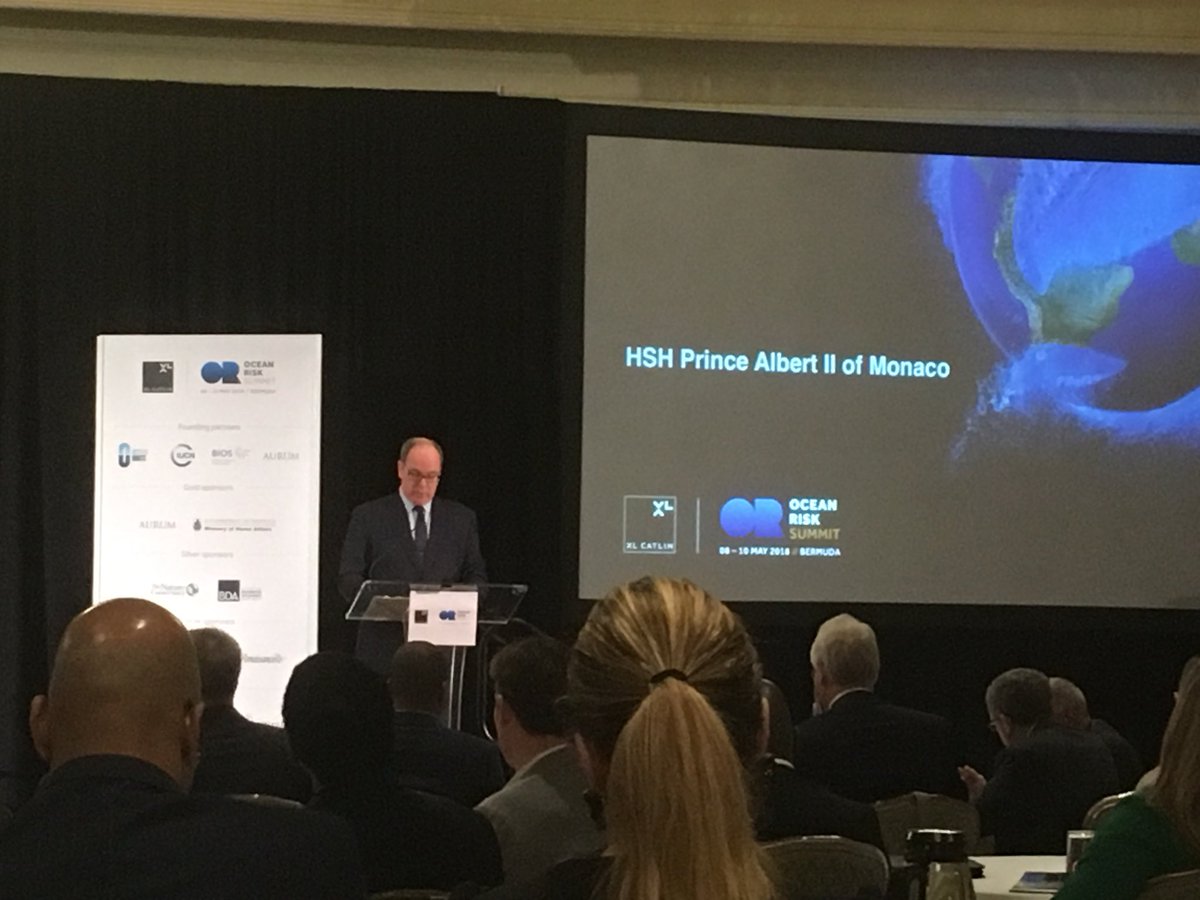
HSH Prince Albert II of Monaco speaking about blue growth
Important role for financial sector
Finance and investment have a crucial role to play in addressing ocean risks. Principles for sustainable investment in the Blue Economy were adopted at The Economist's World Ocean Summit in March. This was a milestone in the transition from compliance to real impact, with the aim of having the 14 principles adopted broadly by the finance sector. Interesting initiatives to finance ocean risk solutions in the Caribbean were discussed at the Ocean Risk Summit too, for example, the Sustainable Oceans Fund; the Inter-American Development Bank's initiatives to mobilise green bonds and blue bonds, contingent loans and guarantees; the Caribbean Climate-Smart Accelerator; and KfW climate risk insurance.
Banks are increasingly interested in climate-resilient sustainable business, aiming at responsible growth. However, banks still focus on credit, political and reputational risks; they are not yet wired to think about "ocean risk" in a holistic way, noted representatives from the industry at the event.
The summit highlighted that insurance may have an important role to play in addressing ocean risk by helping to understand risks and economic costs, which in turn can help to start the process of modelling change, mitigating damage and building programmes for resilience. However, delegates also underlined that insurance should not be a substitute for investment in risk reduction and prevention measures. Delegates discussed how insurance could help to draw attention not just to long-term risks but also to short-term risks of ocean decline. It can also provide an organising framework for natural capital and help to build deeper relationships beyond financial transactions. Ocean risks are increasing, seen, for example, in the rising strength of hurricanes globally. To really account for ocean risk, insurance premiums therefore have to reflect future risk, not past risk. This would also help with more accurate carbon pricing.
Delegates also heard that the present risk assessment systems used in the insurance sector and by credit rating agencies incorporate climate-change risks (short-term shocks and long-term trends), but ocean risk goes well beyond climate risk. So the question was posed whether there was a need for a new risk assessment structure to really account for ocean risk.
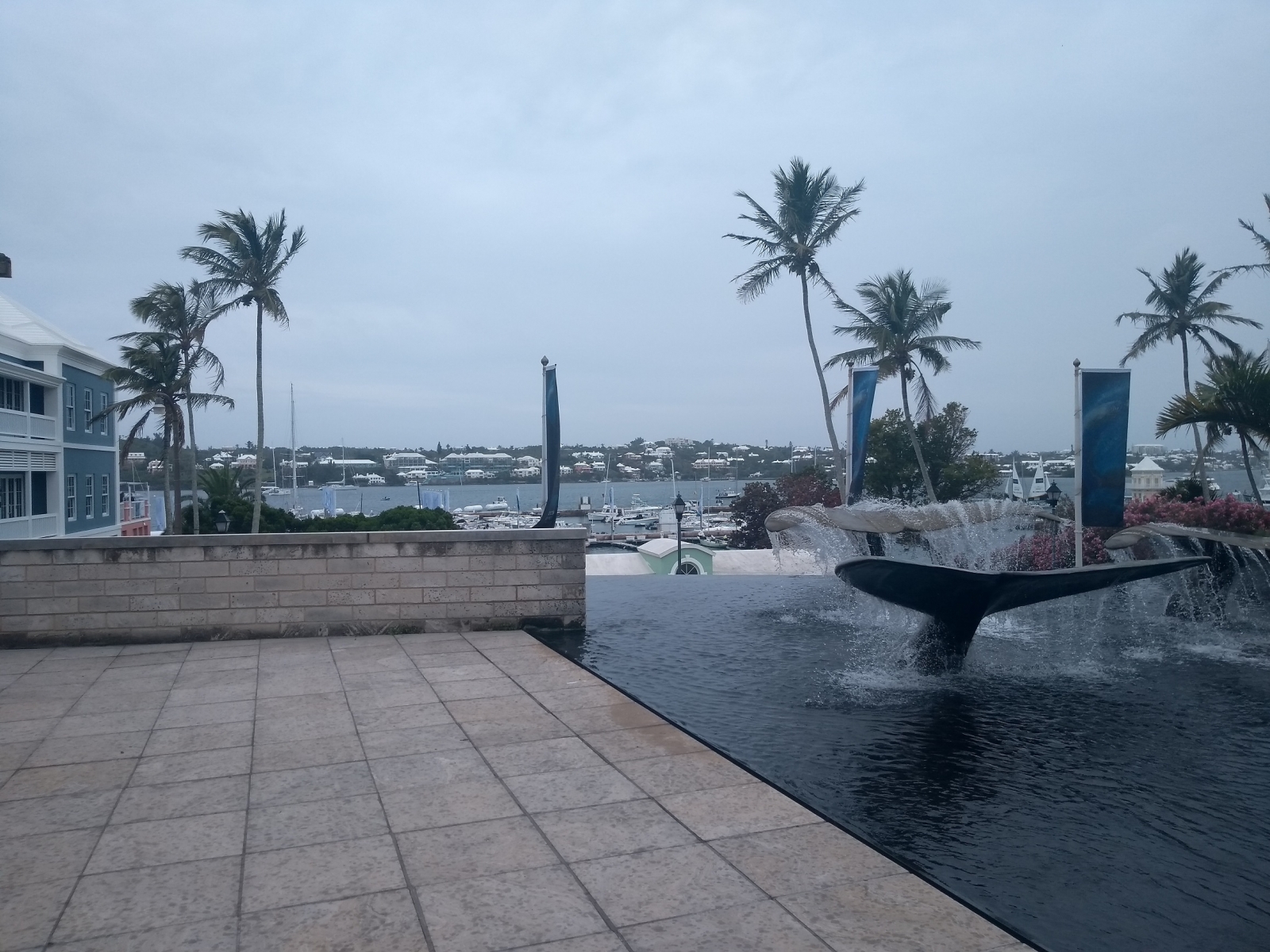
The calm before the storm? The view from XL Catlin’s offices in Bermuda
A rising need to address marine pollution and health concerns
In terms of tackling marine pollution, three key focus areas were identified at the summit. First, the immediate focus should be on investing in better waste management, including the “5 Cs”: collect; capture; contain; keeping in mind context and culture. Second, there's a need to change upstream factors in the medium to long term, especially new materials, product design and systemic change (decoupling waste generation from economic growth). And finally, successful case studies should be taken to scale (if suitable in the local context and culture). Notable examples of good practice include the Indonesia National Plan of Action on marine plastic debris management, the Indonesia Waste Platform gringgo/CashforTrash, plastic bag policies (for example, Israel's law on plastic bag distribution) and new packaging solutions such as PepsiCo's biodegradable packaging.
Ocean elder HM Queen Noor of Jordan highlighted the human toll from ocean degradation linked to issues such as microplastics entering our food chains, pathogenic bacteria from contaminated water and seafood, and the spread of infectious diseases (such as cholera). However, analysing links between climate change, oceans and human health remains tricky. Climate signals (such as sea surface temperature, sea level rise, coral bleaching and so on) have been linked to health signals (bacteria, infections, nutrition, for example), but the summit heard that there is a need to produce more evidence. It is therefore important to look at hazard exposure and vulnerability.
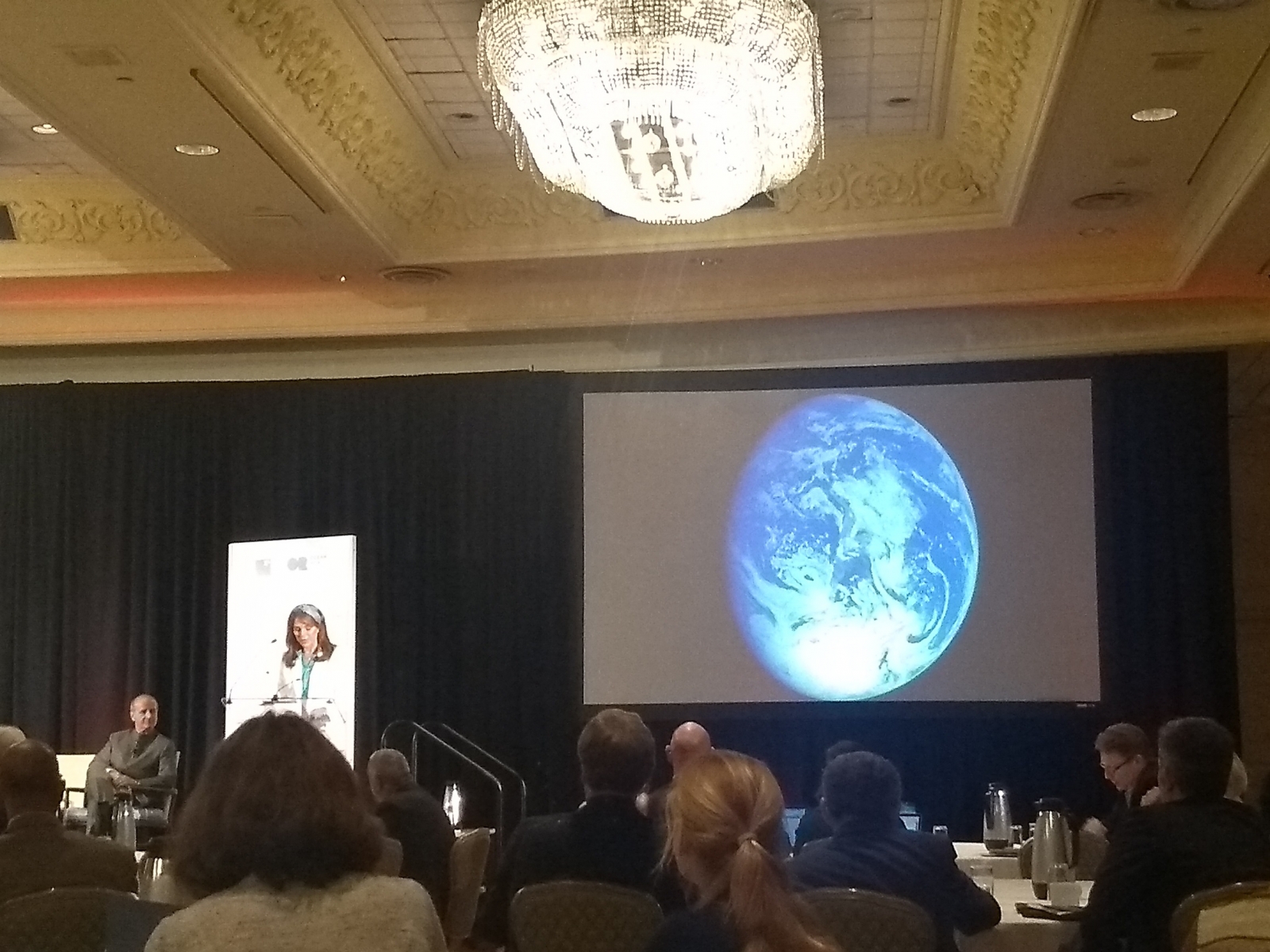
Ocean elder HM Queen Noor of Jordan speaking about human health and ocean risk
An ambitious Ocean Risk Index
In order to capture the complexity of ocean risk and create a meaningful tool for positive policy change for policymakers and other stakeholders, we have been tasked to assess the global state of ocean deterioration and its impact on human activity. Commissioned by XL Catlin, the first phase is focused on developing a framework (i.e., the value, principles, attributes and major components) to assess ocean risk. An international expert group, which gathered in Bermuda around the Ocean Risk Summit, informed the process. This index can be a great catalyst for positive change, and the ocean community expressed support for this undertaking at the summit. The Economist Group's World Ocean Initiative, with support from XL Catlin, is keen to build on recent progress in tackling ocean risk.
The views and opinions expressed in this article are those of the authors and do not necessarily reflect the views of The Economist Intelligence Unit Limited (EIU) or any other member of The Economist Group. The Economist Group (including the EIU) cannot accept any responsibility or liability for reliance by any person on this article or any of the information, opinions or conclusions set out in the article.

